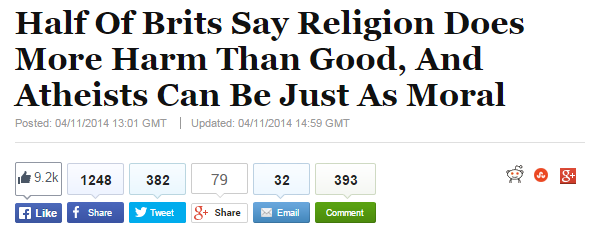
Is religion a force for good or harm in society? A recent poll for the Huffington Post UK found a slim majority (51.6 per cent) of people in Britain agree with the latter.

The most obvious flaw in a poll about religion is the lack of religious respondents – 60.5 per cent of the sample (2,004) is non-religious. Just 8.2 per cent are ‘very religious’ and 30.8 per cent self-identify as ‘somewhat religious’.
How do you quantify religiosity? Identifying as ‘somewhat religious’ accepts a belief in God(s) but that belief also exists outside of Abrahamic concepts and cultural identities. A person can believe in God(s) but view religious institutions negatively. Hence why a fifth of self-identifying religious individuals agree that ‘Religion causes more harm than good in society’. Some religious individuals will reject the label of religion, and view themselves in strictly spiritual terms, so the label ‘No Religion’ is not just for atheists.
A self-identifying person of faith can hold prejudicial views of different religions (and denominations of their own faith). The original question removes nuance and treats religious belief as a static and simplistic identity. Gone is the fluidity of evolving individual religious beliefs. In a national context, specific historical and cultural contexts fostered a ‘Christian identity’ upon Britain, an identity many now challenge as non-belief rises.
How do we measure the societal harm of religion? Are we to assume respondents are insulated from certain horrific global events and only view the question in a British context? The nature of the question is too broad and unhelpful – hence why 24.2 per cent answered ‘Don’t know’. Measuring the societal good of religion is equally problematic in this context.
The poll is weighted in favour of the Abrahamic faiths and relegates many into the ‘Other’ category. In spite of Hinduism being the fourth largest religion in England and Wales (if you include the ‘No Religion’ category from the 2011 Census).
In isolation, the polls does raise some interesting points regarding young people, according to the Huffington Post:
There is a truth to that statement, but on the strand ‘Religion causes more good than harm in society,’ the most positive age group was 18-34 year olds (29.9 per cent). Not 18-24 year olds (29.1 per cent). Yet, 18-24 year olds scored highest in the ‘Don’t Know’ category, which suggests an open mind to the role religion serves in society.
Adults above the age of 65 view religion more positively than 35-64 year olds. Overwhelmingly though, across most age categories, negative assumptions of religion scored higher.
There is a need for a serious debate about the role of religion in British society (and in a global sense), of faith in secular spaces, and how we define our own religious (and spiritual) sentiments.
In isolation, the Huffington Post/Survation poll raises some valid and interesting points, but falls flat in a broader context, an opportunity lost as many confirm their own biases. It ultimately raises more questions than it attempts to answer.